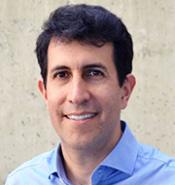Commute Patterns and Depression: Evidence from Eleven Latin American Cities

Dr. Daniel Rodríguez is Chancellor’s Professor of City and Regional Planning. His research focuses on the relationship between transportation, land development, and the health and environmental impacts that follow. His most recent work focuses on the health and equity impacts of urban transportation policy. In a current project he is examining the impact of transportation innovations (bus rapid transit, aerial trams, protected and unprotected bicycle lane networks) on land markets and development.
In another current project, he is examining the dramatic rise in motorcycle use in Latin America. He frames this increase as an unexpected result of urban transportation policy decisions that have failed to limit the appeal of the automobile. At the same time, transit service continues to deteriorate, with fares rising and travel times suffering due to congestion. Motorcycles emerge in this context as a viable option charged with alternative meaning and opportunity, but with enormous personal risks.
As a Faculty Affiliate of the Institute for Urban and Regional Development, Rodríguez is currently leading two research projects (totaling $1.1 million) related to urban health inequalities and the built environment in Latin America. In other work he has considered the land value impact of transit investment and the impact of urban form on physical activity and travelling behavior. On a regional scale, he has studied the relationship between regional policies and travel patterns and how plans can be used to strengthen the connection between transportation and land use.
A majority of Professor Rodríguez’s work is driven by practical problems and finding solutions for planners and policy-makers. Working within the health, nutrition, economics, engineering, geography and public policy disciplines, he has examined how changes to the physical attributes of the environment, such as the location of bus routes, rail lines, supermarkets and trails, are related to changes in physical activity; and how land management tools can be used to encourage transit development and recapture property value increases by public action.
Prior to joining Berkeley, Rodriguez served in the faculty of University of North Carolina, Chapel Hill, where he was Distinguished Professor of Sustainable Communities in the Department of City and Regional Planning. He is a faculty fellow of the Lincoln Institute for Land Policy, and has been a consultant to the Inter-American Development Bank, Andean Development Bank, and the Clean Air Institute.